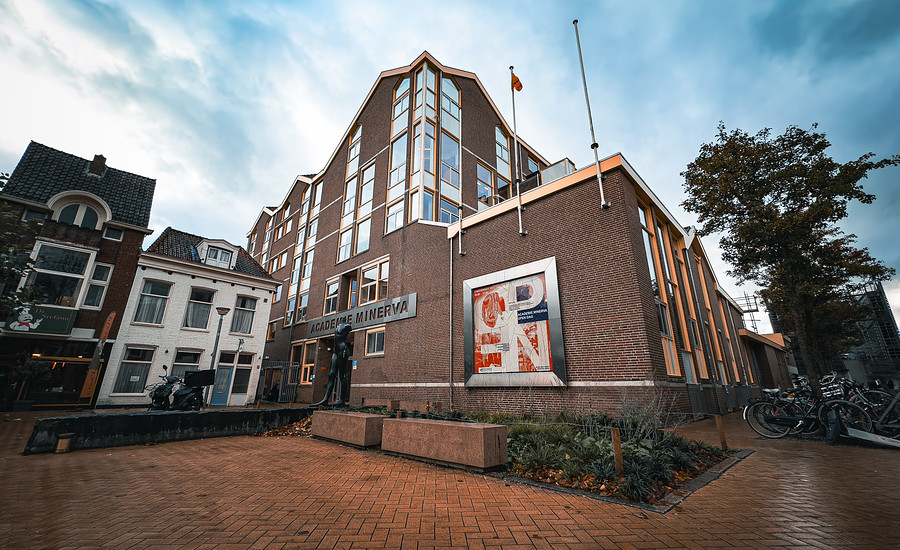- Level
- master
- Form
- full-time
- Duration
- 2 years
- Language
- English
- Locations
- Groningen
- Degree
- Master of Arts
- Startmonths
- Start: September
Revealing Layers: MAPs – Where Process Transforms Practice

Revealing Layers: MAPs – Where Process Transforms Practice
MAPs offers an immersive journey where materials act as collaborators, bringing their own urgencies, stories, and ethical dimensions to your work. Through a hands-on, process-driven approach, you will explore sustainable practices, material alternatives, and the interaction between physical structures and personal presence. Here, artistic research focuses on the impact and agency of materials, adding depth to your practice without centering on products.
Choose MAPs if you are ready to engage deeply with materials as active agents in your creative process. This programme invites you to explore materials beyond their functional role, uncovering their ethical dimensions, physical impacts, and transformative potential. Through a hands-on, experimental approach, you will investigate sustainable alternatives, material resilience, and the creative possibilities of constructive deconstruction. MAPs empowers you to bring new layers of meaning to your practice, embracing an artistic journey where research centers on process, awareness, and transformation rather than solely on finished products.

In the first year of the MAPs programme, you are invited to explore the intricate world of materials, with a focus on artistic research and reflective practice. You are encouraged to move beyond viewing materials as mere tools, challenging you to see them as active carriers of meaning, historical context, and ethical implications integral to your artistic vision.
The curriculum includes key elements such as Lab Weeks and What Matters sessions, comprising Roundtables, Seminars, and Artistic Research Process sessions—each providing a unique approach to engaging with materials and critical ideas.
For instance, during Lab Weeks, you might explore sustainable practices by developing eco-friendly pigments or experimenting with unconventional materials, gaining insight into their environmental impact as well as their artistic potential. These intensive weeks emphasise hands-on experimentation, encouraging you to test, adapt, and sometimes reinvent traditional practices, fostering a deeper understanding of how materials influence your artistic intent.
Roundtables, Seminars, and Artistic Research Process sessions create an environment of critical dialogue and reflective exchange. You will engage in discussions that challenge you to consider the ethical dimensions of your material choices, examining issues such as sustainability, toxicity, and the ecological footprint of materials. These sessions are collaborative, inviting feedback from both peers and faculty, helping you sharpen your approach through shared insights and constructive critique.
Broaden your artistic perspective through guest lectures, specialised workshops, and unique topics that introduce new frameworks and innovative techniques. These sessions expand the conceptual depth of your practice, emphasising contextual thinking and theoretical reflection, enabling you to integrate broader social, cultural, and environmental contexts into your work.
Throughout this year, you will engage in an ongoing Artistic Research Process, logging your findings and reflections and presenting these insights at various stages. For example, you might document how your work evolves in response to exploring sustainable materials or how specific feedback from Roundtables has influenced your artistic choices.
By the end of the first year, you will have developed a nuanced understanding of the various dimensions—material, conceptual, and ethical—that inform your practice. This foundational experience in MAPs fosters critical skills and perspectives that encourage you to approach your work with reflection, sustainability, and contextual awareness, supporting your journey toward a unique and informed creative vision.
In the second year of MAPs, you will synthesise your first-year explorations into a cohesive artistic vision, culminating in a final project and thesis. This year emphasises intensive studio work, where you will refine your materials and techniques, applying the hands-on experimentation and theoretical insights you have gained.
Your final project will reflect your journey, highlighting your ability to integrate insights, ethical considerations, and innovative techniques, resulting in a nuanced artistic statement that embodies your unique perspective and contributions to the field. This culmination of your work will empower you to present a reflective and impactful expression of your material practice.
Curious about the courses you'll take each year? Check out the full overview here!
To enrol in this master's degree programme, submit an enrolment application through Studielink (studielink.nl). On the enrolment form, under the master's programme, select 'Master of Arts in Fine Art and Design' at Hanze and then either MADtech, Painting, iRAP or MAPs in step 4. You will receive by email a login link and details for the 'Hanze Apply' and details of the documents we require from you.
Answer the questions and upload the requested documents: Under "Entrance Minerva" you have to upload the portfolio and other requested documents. The application form and additional information can also be found in the Hanze Apply. Under "International students" you have to upload your passport/ID card, diploma, etc. After everything has been filled out and uploaded, click on the "submit application" button.
After we have received your application form and portfolio, the admissions committee will assess your application documents and decide whether to invite you for an interview. If you live abroad and cannot come to Groningen for this, we can conduct the interview by Microsoft Teams.